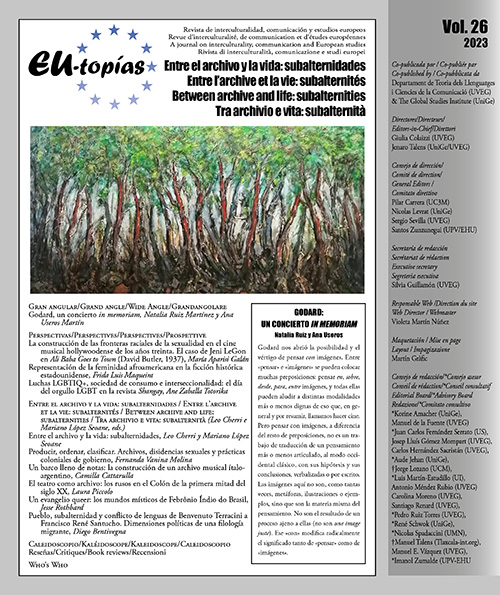A queer gospel: The mystical worlds of Febrônio Índio do Brasil
DOI:
https://doi.org/10.7203/eutopias.26.27665Keywords:
Dissident sexualities, archives, sensationalism, Mário de Andrade, Febrônio Índio do Brasil. Abstract
Abstract
On August 31, 1927, Rio de Janeiro police arrested a suspect they believed was responsible for the murder of two minors on the outskirts of the city. The individual arrested and later imprisoned for the crimes was Febrônio Índio do Brasil, a mixed-race man from one of the most marginal regions of Minas Gerais and who was, allegedly, homosexual. News coverage of the case established Febrônio as one of the most infamous serial killers in Brazilian history, a legacy he maintains to this day. A fundamental element of the sensationalization of the case was the mysterious connection between the murders and a mystical text that Febrônio published the year before under the title As Revelações do Principe do Fogo. Branded as an incomprehensible book, Brazilian positivists used the Revelações as evidence of Febrônio’s madness and, furthermore, to characterize homosexuality as a mental illness. This essay presents a contextual reading of As Revelações to demonstrate the possibility of interpreting the book as a subaltern reaction to the changing racial and urban geographies of Rio in the 1920s. In a city transformed by a notion of modernity in which black and queer bodies had no place, Febrônio created a mystical world where such bodies could continue to exist. His book is a radical reformulation of the book of Revelation that reveals the queer horizons of a world still to come through the dissolution of the holy trinity and the articulation of an erotic intimacy that unites the messianic Prince of Fire with the Divine. Thus, As Revelações represents the textual creation of a queer mystical world.
 Downloads
Downloads
 References
References
Berlant, Warner y Michael Warner. “Sex in Public”, Critical Inquiry, vol. 24, núm. 2, 1998.
De Andrade, Mário. “Um Poeta Místico”, O Estado de São Paulo, p. 4-5, 1939.
Fry, Peter. “Febrônio Índio do Brasil: onde cruzam a psiquiatria, a profecia, a homossexualidade e a lei”, en Carlos Vogt et al (eds.). Caminhos cruzados: linguagem, antropologia, e ciências naturais, eds. Vogt et al. São Paulo: Brasiliense, 1982.
Gomes Ferrari, Pedro Felipe Marques. Mosaicos do Filho da Luz: Febrônio Índio do Brasil entre o crime, a redenção e o delírio. Tesis para la obtención del grado de doctor por la Universidade de Brasilía, Brasil, 2013.
Green, James. Beyond Carnival: Male Homosexuality in Twentieth-Century Brazil. Chicago: University of Chicago Press, 1999.
Leu, Lorraine. Defiant Georgraphies: Race & Urban Space in 1920s Rio de Janeiro. Pittsburgh: University of Pittsburgh Press, 2020.
S/A. “O Febronio Vai Tornando Celebre.” Gazeta de Notícias, p. 4, 4 diciembre 1920.
S/A. As Revelações do Príncipe do Fogo. Rio de Janeiro: Monteiro & Borrelli, 1926.
S/A. “Febrônio Índio do Brasil perante a medicina mental: Estudo de dois cientistas”. Revista Criminal, p. 9-12, 1928.
San Pío X, Catecismo Maior de São Pio X. Niterói: Editoria Permanência, 2015.
Silviano, Santiago. “O Homossexual Astucioso: Primeiras – E Necessariamente Apressadas Anotações”, BRASIL/BRAZIL: A Journal of Brazilian Literature, vol. 13, núm. 23, 2000.
Trevisan, João Silvério. Devassos no Paraíso: A Homossexualidade no Brasil, da Colônia à Atualidade. São Paulo: Objetiva, 2018.
Downloads
Published
How to Cite
-
Abstract168
-
PDF (Español)96
Issue
Section
License
![]()
The authors conserve the copyright. All content published in EU-topías. Journal of interculturality, Communication, and European Studies are subject to the license Creative Commons Attribution-NonCommercial-ShareAlike 4.0 license. The full text of the license can be found at <http://creativecommons.org/licenses/by-nc-sa/4.0>
They may be copied, used, disseminated, transmitted and publicly displayed, provided that:
- The authorship and original source of the publication is cited (journal, publisher and URL of the work).
- They are not used for commercial purposes.
- The existence and specifications of this license of use are mentioned.
It is the responsibility of the authors to obtain the necessary permissions for images that are subject to copyright.



